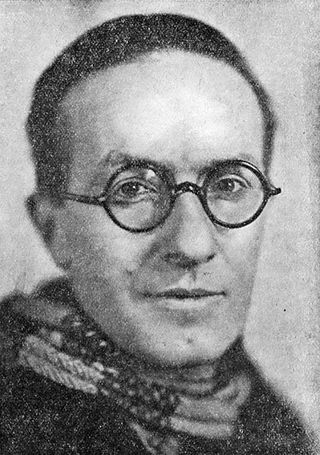Jean Giraudoux
French novelist, essayist, diplomat and playwright (1882–1944) From Wikipedia, the free encyclopedia
Hippolyte Jean Giraudoux (/ʒɪroʊˈduː/;[1] French: [ipɔlit ʒɑ̃ ʒiʁodu]; 29 October 1882 – 31 January 1944) was a French novelist, essayist, diplomat and playwright. He is considered among the most important French dramatists of the period between World War I and World War II.[2]
You can help expand this article with text translated from the corresponding article in French. (July 2018) Click [show] for important translation instructions.
|
Jean Giraudoux | |
|---|---|
 Giraudoux in 1927 | |
| Born | 29 October 1882 Bellac, Haute-Vienne, France |
| Died | 31 January 1944 (aged 61) Paris, France |
| Occupation | Dramatist |
| Notable works | The Madwoman of Chaillot, Ondine, Duel of Angels, The Trojan War Will Not Take Place |
| Spouse | Suzanne Boland |
| Children | 1 son |
His work is noted for its stylistic elegance and poetic fantasy. Giraudoux's dominant theme is the relationship between man and woman—or in some cases, between man and some unattainable ideal.
Biography
Summarize
Perspective
Giraudoux was born in Bellac, Haute-Vienne, where his father, Léger Giraudoux, worked for the Ministry of Transport. Giraudoux studied at the Lycée Lakanal in Sceaux and upon graduation traveled extensively in Europe. After his return to France in 1910, he accepted a position with the Ministry of Foreign Affairs. With the outbreak of World War I, he served with distinction and in 1915 became the first writer ever to be awarded the wartime Legion of Honour.[3]
He married in 1918 and in the subsequent inter-war period produced the majority of his writing. He first achieved literary success through his novels, notably Siegfried et le Limousin (1922) and Eglantine (1927). An ongoing collaboration with actor and theater director Louis Jouvet, beginning in 1928 with Jouvet's radical streamlining of Siegfried for the stage, stimulated his writing.[4] But it is his plays that gained him international renown. He became well known in the English speaking world largely because of the award-winning adaptations of his plays by Christopher Fry (Tiger at the Gates) and Maurice Valency (The Madwoman of Chaillot, Ondine, The Enchanted, The Apollo of Bellac).
Giraudoux served as a juror with Florence Meyer Blumenthal in awarding the Prix Blumenthal, a grant given between 1919 and 1954 to painters, sculptors, decorators, engravers, writers, and musicians.[5] In politics he was affiliated with the Radical Party, served in the cabinet of Édouard Herriot in 1932, and was appointed as Minister of Information by Édouard Daladier in 1939.[6][7]
He is buried in the Cimetière de Passy in Paris.[8]
Works
Summarize
Perspective
Theatrical productions
Films
|
Publications
|
English-language collections
- Giraudoux, Jean (1958), Four Plays, Adapted by Maurice Valency. New York: Hill and Wang, Inc. OCLC 807008 [Volume 1: Ondine, Enchanted, Madwoman of Challot, Apollo of Bellac]
- Giraudoux, Jean (1964), Three Plays, vol. 2, Translated by Phyllis La Farge and Peter H. Judd. New York: Hill and Wang. OCLC 751419 [Volume 2: Siegfried, Amphitryon 38, Electra]
- Giraudoux, Jean (1963), Three Plays, Translated by Christopher Fry. New York: Oxford University Press. OCLC 21419365 [Volume I: Tiger at the Gates; Duel of Angels; Judith]
- Giraudoux, Jean (1967), Plays, vol. 2, Translated by Roger Gellert. London: Oxford University Press. OCLC 656767230 [Amphitryon; Intermezzo; Ondine]
References
Further reading
External links
Wikiwand - on
Seamless Wikipedia browsing. On steroids.
